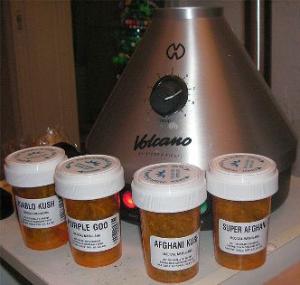The 2011 National Drug Control Strategy: Drug Policy on Autopilot [FEATURE]
The Office of National Drug Control Policy (ONDCP -- the drug czar's office) Monday released this year's version of the annual guiding federal document on drug policy, the 2011 National Drug Control Strategy, and there's not much new or surprising there. There is a lot of talk about public health, but federal spending priorities remain weighted toward law enforcement despite all the pretty words.
The strategy promises continued strong law enforcement and interdiction efforts, including going after the opium and heroin trade in Afghanistan and cooperating with Mexican and Central American authorities in the $1.4 billion Plan Merida attack on Mexican drug gangs.
"Drug use affects every sector of society, straining our economy, our healthcare and criminal justice systems, and endangering the futures of our young people," said ONDCP head Gil Kerlikowske in introducing the strategy. "The United States cannot afford to continue paying the devastating toll of illicit drug use and its consequences."
This is all standard stuff. One thing that is new is ONDCP's felt need to fight back against rising momentum to end the drug war, or at least legalize marijuana, and rising acceptance of medical marijuana. The strategy devoted nearly five full pages to argumentation against legalization and medical marijuana.
"Marijuana and other illicit drugs are addictive and unsafe," ONDCP argued in a section titled Facts About Marijuana. "Making matters worse, confusing messages being conveyed by the entertainment industry, media, proponents of 'medical' marijuana, and political campaigns to legalize all marijuana use perpetuate the false notion that marijuana use is harmless and aim to establish commercial access to the drug. This significantly diminishes efforts to keep our young people drug free and hampers the struggle of those recovering from addiction."
Just to be clear, ONDCP went on to say flatly "marijuana use is harmful," although it didn't bother to say how harmful or compared to what, nor did it explain why the best public policy approach to a substance that causes limited harm is to criminalize it and its users.
ONDCP also argued that despite medical marijuana being legal in 16 states and the District of Columbia, "the cannabis (marijuana) plant is not a medicine." Somewhat surprisingly, given that the DEA just days ago held that marijuana has no accepted medical use, the national drug strategy conceded that "there may be medical value for some of the individual components of the cannabis plant," but then fell back on the old "smoking marijuana is an inefficient and harmful method" of taking one's medicine.
"This administration steadfastly opposes drug legalization," the strategy emphasized. "Legalization runs counter to a public health approach to drug control because it would increase the availability of drugs, reduce their price, undermine prevention activities, hinder recovery support efforts, and pose a significant health and safety risk to all Americans, especially our youth."
It was this section of the strategy that excited the most attention from drug policy reformers. They lined up to lambast its logic.
"It is encouraging that ONDCP felt a need to address both medical marijuana and general legalization of the plant in its 2011 strategy booklet, which was released today," noted Jacob Sullum at the Reason blog. "It is also encouraging that the ONDCP's arguments are so lame… The ONDCP never entertains the possibility that a product could be legal even though it is not harmless. Do the legality of alcohol and tobacco send the message that they are harmless? If you oppose a return to alcohol prohibition, should you be blamed for encouraging kids to drink and making life harder for recovering alcoholics? ONDCP director Gil Kerlikowske may have renounced the use of martial rhetoric to describe the government's anti-drug crusade, but he still manages to imply that reformers are traitors whose 'confusing messages' are undermining morale in the nation's struggle against the existential threat of pot smoking."
"It's sad that the drug czar decided to insert a multi-page rant against legalizing and regulating drugs into the National Drug Control Strategy instead of actually doing his job and shifting limited resources to combat the public health problem of drug abuse," said Neill Franklin, director of Law Enforcement Against Prohibition. "Obama administration officials continually talk about the fact that addiction is a medical problem, but when our budgets are so strained I cannot understand why they're dumping more money into arrests, punishment and prisons than the Bush administration ever did. The fact is, once we legalize and regulate drugs, we will not only allow police to focus on stopping violent crime instead of being distracted by arresting drug users, but we will also be able to put the resources that are saved into funding treatment and prevention programs that actually work. Who ever heard of curing a health problem with handcuffs?"
Some reformers offered a broader critique of the strategy.
"Other than an escalating war of words on marijuana, it's all pretty much the same thing as last year," said Bill Piper, director of national affairs for the Drug Policy Alliance. "There's nothing really new here, except they are a bit more punitive this year," he added, citing the pushback on marijuana, the call for a drugged driving offensive, and a call to encourage workplace drug testing. "Last year, it was more about reform, but this year ONDCP is up to its old tricks again. Whatever window they had to turn over a new leaf is closed; Kerlikowske has been fully captured by the drug war establishment."
The Obama administration could pay a price for its intransigence on drug policy, said Piper.
"They badly underestimate the American people and the drug reform movement, especially on medical marijuana," he said. "It's not just the strategy, but the DEA refusal to reschedule and the Department of Justice memo, too. They are talking about coming out big against medical marijuana, but I think they know there is little they can do. In a sense, this is an act of desperation, a sign that we are winning. First they ignore you…"
The veteran drug reform lobbyist also professed concern about the drugged driving campaign. The strategy sets as a goal a 10% reduction in drugged driving (although it doesn’t even know how prevalent it is) and encourages states to pass zero tolerance per se DUID laws that are bound to ensnare drivers who are not impaired but may have used marijuana in preceding days or weeks.
"We are concerned about getting states to pass those laws," he said. "They are problematic because people can go to jail for what they did a week ago. We're also concerned about the push for employee drug testing."
Piper's overall assessment?
"There's not a lot of new policies there, and that's disappointing," he said. "This is a drug policy on autopilot; it's just a little more aggressive on the marijuana issue."
Chronicle Book Review: The Wars of Afghanistan
The Wars of Afghanistan: Messianic Terrorism, Tribal Conflicts, and the Failures of Great Powers, by Peter Tomsen (2011, Public Affairs Press, 849 pp., $39.99 HB)
Meanwhile, US drone attacks killed a reported 58 suspected terrorists on the Pakistan side of the border, the latest in an escalating campaign aimed at Al Qaeda, Taliban, and affiliated fighters in what had formerly been a secure rear base for Afghan insurgents and Arab Islamist holy warriors alike. And, nearly a decade after the US invaded Afghanistan to eliminate Al Qaeda and the Taliban, US and NATO soldiers are killing and being killed on a daily basis. Five French NATO troops died Tuesday in a roadside bombing.
If its timing couldn't be better, it is also difficult to imagine a more impeccably informed author than Peter Tomsen, a career State Department diplomat who served as the ambassador-rank US special envoy to the Afghan mujahedeen from 1989 to 1992, met with everyone from Saudi and Russian diplomats to Afghan warlords of various stripes to the Taliban to the Pakistani military and intelligence officers who guided the jihad against the Russians, then played the Americans for fools for the past quarter-century. Tomsen, now retired from the State Department, has kept a close eye on the region ever since, and, with The Wars of Afghanistan, has produced a magnum opus.
The Wars of Afghanistan is not about opium farmers or drug trafficking. Tomsen mentions US concerns about the drug trade as part of longstanding American policy considerations in Afghanistan, and he makes occasional references to this or that warlord fighting over control of the drug trade, but that's about the extent of it for drug policy. And that's just fine, because while Drug War Chronicle is by its very nature drug policy-centric, larger reality is not necessarily so, and neither are the conflicts in Afghan and Pakistan. As drug policy wonks, it behooves us to view our concerns within the broader context, and in this particular case, while Tomsen perhaps underplays the role of drug prohibition and the poppy trade in the Afghanistan wars of the past 30 years, he does an outstanding job of making a hideously complex and complicated conflict comprehensible to the educated lay reader.
Tomsen guides readers through the intricacies of Afghanistan's still powerful ethnic and tribal politics, the delicate balance between center and periphery in the Afghan state, and -- very importantly -- how successive outside powers have failed to understand the nature of Afghan politics, fatally undermining their efforts to control Afghanistan for their own purposes. The US is just the latest, and, Tomsen argues, is making the same errors as the British, the Soviets, and the Pakistanis before them.
Equally importantly, Tomsen makes a highly persuasive case that since the withdrawal of the Soviets in 1988, the US and Pakistan -- ostensible allies -- have actually been deadly rivals in Afghanistan, with the Pakistani intelligence services (the ISI) and the Pakistani military high command working relentlessly to create an "unholy alliance" of Islamic fundamentalist radicals -- Wahhabite Arabs including bin Laden and Al Qaeda also supported by Saudi cash, disaffected Pashtuns from both sides of the border, Pakistani religious parties and their militias, Islamic militants from around the world, and now, the Afghan and Pakistani Taliban -- first to drive out the Soviets, then later and to the present day to impose an Islamic fundamentalist puppet state in Kabul. Tomsen names names and cites specific meetings, as well as relying on once classified diplomatic cables and other sources to make his case.
It's bad enough to think successive US governments dating back to Clinton have been suckered by Pakistani duplicity -- the US government has given the Pakistanis $13 billion in military assistance since 2001, some not insignificant portion of which has gone to support the Taliban and associated warlords (Gulbuddin Hekmatyr, the Haqqani network) killing US, NATO, and Afghan soldiers in Afghanistan -- but Tomsen offers an even more damning assessment of the role of the CIA and, to a lesser degree, the Pentagon.
Going back to the Afghan civil wars of the early 1990s, after the Soviet effort at hegemony in Afghanistan collapsed (and helped precipitate the collapse of the Soviet Union itself), Tomsen argues persuasively that the CIA effectively allowed itself to be led by the ISI, thus subverting official US policy in Afghanistan. In that era, US policy (running on autopilot after the Russians left) was to support movement toward a broad-based, moderate, democratic Afghan government, but the CIA instead supported the ISI in its efforts to impose a fundamentalist Islamic warlord government. The CIA thus helped turn Afghanistan into a bloody "shatter zone" for years and abetted the rise of the Taliban. This is ugly and disturbing stuff and cries out for deeper investigation.
While Tomsen has harsh words for every US administration since Bush the Elder when it comes to Afghanistan policy, he does give the Obama administration some props for its belated efforts to turn the screws on the Pakistanis and to actually make a working Afghan government. In fact, the US action cutting military assistance this week could have come right out of Tomsen's playbook for how to begin extricating ourselves from this graveyard of empires.
But we're a long way from there right now. There are currently about 100,000 US and 30,000 NATO troops in Afghanistan and, Tomsen reports, about 150,000 mercenaries and contractors. We are spending $2 billion a week to support our war efforts there, and through a decade of military assistance to our Pakistani "allies," contributing hundreds of millions or billions more to the people who are killing our troops. Bizarrely, in this Afghanistan war, we seem to be paying for both sides.
The drug trade in Afghanistan is probably worth a billion or two dollars a year, but that's what US taxpayers are spending there in a week. Yes, the profits of prohibition fill the coffers of the Taliban… and criminal gangs… and Afghan traffickers… and Pakistani traffickers… and Afghan government officials, not to mention tens of thousands of Afghan farm families, but, as Tomsen makes perfectly clear, it's not all about the drugs.
The Wars of Afghanistan is an important work and an urgent warning. Anyone with an interest US foreign policy in the region needs to read it, starting with our policymakers.
ALERT: Stop the Feds' Medical Marijuana Crackdown
- The Obama DOJ is raiding marijuana dispensaries at twice the rate the Bush DOJ did.
- US Attorneys have sent misleading, threatening letters to state legislatures considering dispensary laws.
- A DOJ memo sent late last month, claiming to "clarify" an earlier memo that supported states rights to medical marijuana, in fact backtracked on it. While the federal government is not targeting patients themselves, they are making it more difficult for them to obtain marijuana legally and safely.
Thank you for taking a stand. Visit http://stopthedrugwar.org for news and commentary about all aspects of the drug war. Click here for our medical marijuana archive page, or here for our medical marijuana RSS feed.
Mexico Drug War Update
by Bernd Debusmann Jr.
Mexican drug trafficking organizations make billions each year smuggling drugs into the United States, profiting enormously from the prohibitionist drug policies of the US government. Since Mexican president Felipe Calderon took office in December 2006 and called the armed forces into the fight against the so-called cartels, prohibition-related violence has killed around 40,000 people, including more than 15,000 last year. The increasing militarization of the drug war and the arrest or killing of dozens of high-profile drug traffickers have failed to stem the flow of drugs -- or the violence -- whatsoever. The Merida initiative, which provides $1.4 billion over three years for the US to assist the Mexican government with training, equipment and intelligence, has so far failed to make a difference. Here are a few of the latest developments in Mexico's drug war:

In Matamoros, a series of shootouts caused heavy disruptions on a highway to a nearby tourist beach. The clashes began when a Mexican army patrol encountered a convoy of gunmen traveling in SUVs. Military helicopters reportedly also participated in the fighting, and cartel gunmen hijacked trucks and parked them across the highway at several locations as makeshift blockades.
Friday, July 8
In downtown Monterrey, 20 people were killed and several others wounded when gunmen attacked a bar. Another victim died later in the hospital. Mexican news outlets have said that the bar was rumored to be a Zeta hangout, and that the killings may have been due to a dispute over narcotics sales. Signs hung up in cities across Mexico afterwards blamed the shooting on the Gulf Cartel, which is fighting for control of Monterrey with the Zetas.
In Michoacan, heavy fighting between federal forces and cartel gunmen took place in several cities. The fighting began on Thursday evening when gunmen -- thought to belong to the Knights Templar Organization -- set hijacked cars aflame to block roads across the state. Signs hung up during the fighting claimed that federal police had raped women during operations in the state. The Knights Templar organization is an offshoot of La Familia Michoacana, which splintered after several important leaders were killed or captured.
In Valle de Chalco, near Mexico City, the bodies of ten men and a woman were found. All 11 were handcuffed and executed. Some reports indicate that a female survivor was taken from the scene and is in the hospital.
Saturday, July 9
In Torreon, authorities discovered ten decapitated bodies in the back of an abandoned truck. Threatening messages were left at the scene, but the content has not been released to the public. Three of the dead were females. The Sinaloa Cartel and the Zetas are currently battling for control of the Torreon area, which has been the scene of some of the most high-profile incidents of Mexico's drug war.
In Ciudad Juarez, 14 people were murdered in different parts of the city. In one incident, gunmen fled on foot from the scene of a murder after their car broke down during the getaway. In another incident, two children were taken by authorities after their mother was seriously wounded in a shooting incident in front of them. Among the additional dead was a man who was found beaten to death in a canal.
In Hermosillo, federal police captured a high-ranking American-born member of the Tijuana Cartel. Armando Villareal Heredia, 33, is a San Diego native and is thought to report directly to Tijuana Cartel boss Fernando Sanchez Arellano, "The Engineer." Villareal is also wanted in the US on federal conspiracy and racketeering charges, and is thought to be linked to kidnappings and murders on both sides of the border.
In Monterrey, the Army rescued 20 hostages from a cartel safe house. All were found handcuffed in a small room and it appears all the victims were tortured. They had been held for 11 days.
Sunday, July 10
In Ciudad Juarez, seven people were murdered. In one incident, a family of three was attacked by gunmen wielding AK-47's, who riddled the family's Honda Civic with bullets. A man in the car reportedly returned fire with a pistol. A woman in the car died at the scene, and the man and a 3-year old child were taken to the hospital.
Monday, July 11
In Ciudad Juarez, at least 13 people were murdered, including eight that were murdered during two separate multiple homicides. In one incident, five people were gunned down by gunmen using automatic weapons just outside a hospital. Two other people were seriously wounded in the incident.
Tuesday, July 12
In Mexico City, the Mexican Supreme Court ruled that military officers and personnel should be tried in civilian courts when accused of abuses such as torture and extrajudicial killings. The Mexican military has traditionally handled such matters internally and very quietly.
[Editor's Note: We cannot accurately tally the drug prohibition-related killings in Mexico at this time. El Universal, the only Mexican newspaper that was doing so on a regular basis, has stopped. We will have to rely on official pronouncements on the death toll, and will report them when they happen. Below are the numbers through the end of last year. With more than 1,400 reported dead in April alone, this year's toll could well exceed last year's. As of this month, we believe the total death toll in Calderon's drug war has surpassed 40,000.]
Total Body Count for 2007: (approx): 4,300
Total Body Count for 2008: (approx.): 5,400
Total Body Count for 2009: (approx.) 9,600
Total Body Count for 2010: (official) 15,273
Total Body Count for 2011: (approx.): 6,000
This Week's Corrupt Cops Stories
A former Border Patrol agent goes to prison, a former deputy police chief cops a plea, a sticky-fingered former cop gets sent away, too, and a deputy and three jail guards get busted. Let's get to it:

In Yorkville, Illinois, the former Yorkville deputy police chief pleaded not guilty July 6 to charges he stole opioid pain relievers from the department's drug take-back program. Dave Delaney, 37, is charged with possession of a controlled substance and theft of government property. The drug take-back program was designed to allow residents to turn over to police expired and unused prescription drugs for safe disposal, but Yorkville Police became suspicious that some of the turned in drugs were missing and asked the Illinois State Police to investigate. State police found some of the missing drugs in Delaney's possession. Delaney was demoted from his deputy chief position and is currently on unpaid leave with the department. He faces up to three years in prison and heads to court again in late August.
In Muscatine, Iowa, a former Muscatine police officer was sentenced last Friday to five years in prison after being caught with cocaine and missing drug money. Scott David Burk, 48, went down after fellow officers in the Muscatine County Drug Task Force searched his home and vehicle and found the dope and currency missing from the task force evidence room. In May, Burk pleaded guilty to misdemeanor possession of a controlled substance, a drug tax stamp violation, and second-degree theft. The latter two counts are both felonies. Burk had been free on supervised release since pleading guilty, but was immediately taken into custody and delivered to the Iowa Department of Corrections in Oakdale. He had been undergoing drug treatment and attending Alcoholics Anonymous while awaiting sentencing.
In Brownsville, Texas, a former Customs and Border Patrol officer was sentenced July 6 to 17 years in federal prison for taking $500,000 in bribes from a Mexican drug cartel over a 3 ½ year period to allow cocaine and illegal aliens to cross the border unimpeded. Luis Enrique Ramirez, 39, had fled to Mexico after being indicted, but was captured while trying to reenter the US. He pleaded guilty in March to bribery, cocaine distribution, and cocaine conspiracy charges.
Prince of Pot Marc Emery Catches "Superbug" in US Prison
Canadian marijuana legalization activist Marc Emery has contracted a "superbug" while serving a US federal prison sentence for selling marijuana seeds, his wife, Jodie, told local media Sunday. Emery has been diagnosed with MRSA (Methicillin-Resistant Staphylococcus Aurea), a painful infection that appears on the skin.

Ironically, Technology Review reported last fall that chemicals found in marijuana plants "could soon outshine conventional antibiotics in the escalating battle against drug-resistant bacteria. The compounds, called cannabinoids, appear to be unaffected by the mechanism that superbugs like MRSA use to evade existing antibiotics," the Review noted, citing recently published scientific research.
Jodie Emery said Emery's MRSA problem began when he was bitten by a brown recluse spider while serving time at a Georgia prison, and the bite took months to heal. He was treated with antibiotics, but developed a painful boil while being transferred by bus to another prison in Mississippi. When prison doctors tested the boil, they discovered the MRSA infection.
"I was worried sick to hear it," she said, adding that he was forced to fight the bug without medication. The infection has stabilized, but Emery is still infected, she said. "I'm still very concerned. He has to be extra vigilant with any cuts or scrapes."
Emery, who made a small fortune selling pot seeds but gave most of it away to legalization activists in Canada and around the world, was sentenced to five years in prison in September 2010 after being extradited from Canada. A recent bid to serve the remainder of his sentence in his home country was rejected by prison authorities. He can try again in a little under two years.
In a Monday interview with the magazine he founded, Cannabis Culture, Emery said that while his infection was "definitely a concern," he was currently healthy and feeling fine.
DEA Denies Marijuana Rescheduling Petition
The DEA last Friday denied a petition asking the federal government to reschedule marijuana out of Schedule l of the Controlled Substances Act. The petition had languished within the caverns of federal bureaucracies for nine years, but the agency finally moved to deny it two months after medical marijuana advocates filed a lawsuit to compel the government to act.

While marijuana has abuse potential, a DEA judge in 1989 cited it as one of the safest therapeutic substances known to man, and it is currently being used as a legal medicine under the laws of 15 states and the District of Columbia. But DEA officials overruled their own judge and left marijuana in Schedule I.
DEA attitudes toward marijuana [Ed: and toward science] have not changed much in 20 years -- in Friday's Federal Register, the agency wrote: "Marijuana continues to meet the criteria for schedule I control under the CSA because marijuana has a high potential for abuse, marijuana has no currently accepted medical use in treatment in the United States, and marijuana lacks accepted safety for use under medical supervision."
Given that marijuana is being used medically in states across the country, it is worth a bit deeper look into the DEA's rationale for saying it has no currently accepted medical use. "According to established case law, marijuana has no 'currently accepted medical use' because the drug’s chemistry is not known and reproducible; there are no adequate safety studies; there are no adequate and well-controlled studies proving efficacy; the drug is not accepted by qualified experts; and the scientific evidence is not widely available," the DEA claimed.
"Although this superficially looks like a defeat for the medical marijuana community, it simply maintains the status quo" said Joe Elford, chief counsel for coalition member Americans for Safe Access (ASA) and lead counsel in the recent lawsuit. "More importantly, however, we have foiled the government's strategy of delay and we can now go head-to-head on the merits, that marijuana really does have therapeutic value."
Americans for Safe Access said it plans to appeal the denial of the petition to the DC Circuit Court as soon as possible. The group noted that the denial was dated June 30, one day after the Justice Department issued a memo threatening to prosecute commercial medical marijuana operations and even state and local officials who attempt to implement state medical marijuana laws.
"The federal government is making no bones about its aggressive policy to undermine medical marijuana," said ASA executive director Steph Sherer, "And we're prepared to take the Obama administration to court over it."
The group also noted that the petition denial comes in the same week as the 21st annual symposium of the International Cannabinoid Research Society, which is sponsored in part by the National Institute on Drug Abuse and Elsohly Laboratories, the federal government's only licensed source of research-grade marijuana, and an array of pharmaceutical companies interested in asking the government to reschedule organic THC so they can sell a generic version of Marinol, which is now produced synthetically.
"The government cannot have it both ways; marijuana is either a medicine or it's not," continued Sherer. "If the government is going to sponsor a conference on medical marijuana, it should show the same deference to the millions of patients across America who simply want access to it."
Colorado Marijuana Initiative Campaign Gets Underway
Signature gathering began last Thursday for an initiative that would end marijuana prohibition in Colorado and create a system in which its sale would be taxed and regulated. Sponsored by the Campaign to Regulate Marijuana Like Alcohol, the initiative could be only the first of several competing marijuana initiatives aiming at Colorado's November 2012 ballot.

That means it is likely to come up with the resources to hurdle the relatively low bar of gathering 86,000 valid voter signatures in the next 180 days and actually be on the ballot next year.
"Voters in Colorado are ready to end marijuana prohibition and begin regulating and taxing it in a manner similar to alcohol," said Vicente, one of the initiative's two formal proponents. "By regulating and taxing marijuana like alcohol Colorado can tightly control its production and sale, generate tens of millions of dollars in new tax revenue, and redirect our limited law enforcement resources toward serious crimes."
According to the campaign, the Regulate Marijuana Like Alcohol Act of 2012 would:
- Remove criminal penalties for the private possession of up to one ounce of marijuana, and for the home-growing of up to six marijuana plants in an enclosed locked space, similar to the number allowed under current medical marijuana laws;
- Direct the Department of Revenue to establish a tightly regulated system through which it licenses retail stores, cultivation facilities, product manufacturing facilities, and testing facilities;
- Require the general assembly to enact an excise tax of up to 15% on the wholesale sale of marijuana applied at the point of transfer from the cultivation facility to a retail store or product manufacturer (sales tax will also be applied at the point of retail sales);
- Direct the general assembly to establish a system of regulating the cultivation, processing, and sale of industrial hemp;
- Give cities or counties the right to ban marijuana establishments either through elected officials or via citizen initiative;
- Leave current impaired driving laws intact; and
- Preserve the right of employers to maintain their current employment policies (meaning those employers who use drug tests could still fire someone who tests positive).
"This will be a high-energy, volunteer-powered grassroots campaign," said initiative proponent Tvert. "We're excited to begin petitioning and speaking to voters one-on-one about the benefits of repealing the wasteful prohibition of marijuana and replacing it with a tightly controlled system in which it is regulated and taxed like alcohol."
The system the initiative would set up is more restrictive in some ways than today's alcohol regulation. For example, there are no legal limits on the amount of alcohol someone can possess. That means possession of more than an ounce or more than one's harvest would still be a criminal offense, as would growing more than six plants.
The initiative's less-than-absolutist position has in turn helped motivate advocates of a more radical approach. One group working to bring what they call a "true legalization" initiative to the ballot is Legalize 2012, led by long-time Colorado activist Lauro Kriho. Kriho and company are still working on the language for their initiative, but have attacked the Regulate Marijuana Like Alcohol initiative as not "legalization" and not "similar to alcohol."
Whether Legalize 2012 acts as a drag on the Like Alcohol initiative like Stoners Against Prop. 19 did in California last year or whether it boosts its prospects by making it appear that much more pragmatic and palatable to Colorado voters remains to be seen. It's going to be an interesting next year and a half in Colorado pot politics.
Missouri Marijuana Legalization Initiatives Filed
Twin initiatives that would regulate marijuana sales and production and legalize the possession of pot by adults were filed with the state Secretary of State's office Wednesday. The initiatives were filed by a new coalition called Show-Me Cannabis.

The initiative would:
- Remove marijuana from the state's schedule of controlled substances;
- Legalize marijuana possession by adults over 21 (no amount specified);
- Legalize the cultivation of up to 100 square feet of marijuana for personal use;
- Allow for licensed commercial marijuana cultivation and sales;
- Allow the legislature to enact a tax of up to $100 a pound on marijuana sold for personal use;
- Allow for medical marijuana use with a doctor's recommendation and apply protections to doctors and patients;
- Allow employers to fire workers who are impaired on the job;
- Make no changes to impaired driving laws; and
- Allow for the production of industrial hemp.
"The state presently spends millions of tax dollars incarcerating citizens who use cannabis, depriving those imprisoned of the ability to earn a living, pay taxes and care for their families," said initiative backer Fred Raines, Professor Emeritus of Economics at Washington University. "Meanwhile, the law of supply and demand continues to support an unending criminal enterprise. The social and economic costs of prohibition continue to far outweigh any benefits. It's time we acknowledge that and move forward."
Also backing the campaign are the Missouri affiliate of the National Organization for the Reform of Marijuana Laws, NORML chapters in St. Louis, Kansas City, Joplin; the MU campus in Columbia, the MSSU campus in Joplin, Students for Sensible Drug Policy, and the medical marijuana group Sensible Missouri.
Missouri is now at least the sixth state where efforts to get marijuana legalization on the November 2012 ballot are underway. The others are California, Colorado, Massachusetts, Oregon and Washington.
Washington Marijuana Legalization Initiative Falls Short
An initiative that would have legalized marijuana in Washington state will not be on the November ballot after organizers Sensible Washington said last week that they had been unable to gather sufficient signatures with their all-volunteer campaign. That's two years in a row that Sensible Washington has come up short in signature-gathering campaigns.

"It is with heavy hearts but undiminished resolve that we report that we did not reach our signature gathering goal for I-1149," Sensible Washington said in a blog post. "Simply put, we did not have enough boots on the ground to make it happen."
Relying on volunteer signature-gatherers is always difficult, the group said, and more so during a cold, rainy spring before an off-off-year election.
"We cannot escape the need for at least some level of paid signature gathering," the group said. "As in 2010, we could very easily have garnered the necessary support from the public -- if only we'd had the money. Fundraising needs to be our top priority in the coming months. A full postmortem on the 2011 campaign will be conducted soon, but this much is already obvious."
The Sensible Washington signature drives failed at least in part because the group was unable to bring major state and national players on board. Last year, the ACLU of Washington opposed the initiative, and this year, the group is part of a coalition called New Approach Washington that is campaigning to place a marijuana regulation initiative on the November 2012 ballot.
That initiative is not as radical as I-1149. It would see commerce in marijuana licensed through the state liquor board, would maintain the current ban on personal cultivation except for patients, and includes a drugged driving provision that assumes anyone with a blood concentration of more than 5 nanograms per milliliter is driving under the influence.
The New Approach Washington initiative has won broader backing, both statewide and nationally than the Sensible Washington initiative. It has until December 30 to gather the 241,153 valid signatures needed to make the 2012 ballot.
Miami Beach Likely to Vote on Marijuana Decrim
Voters in Miami Beach could make it the first city in Florida to decriminalize marijuana possession after campaigners announced Tuesday they had turned in more than double the number of voter signatures needed for their initiative to make the ballot. They needed 4,300 signatures and turned in more than 9,000.

The group turned in the signatures at Miami Beach City Hall Wednesday at 4:20pm. Then they had a rally.
"It's a great day for the the marijuana legalization movement in Florida," the group's chairman, Ford Banister, said. "For the first time, Florida voters will soon decide a marijuana related question."
"Our staff and volunteer canvassers have worked hard to gather the petitions over the last thirteen months. We have been involved in the community and gotten to know it very well. Based on the overwhelmingly positive response of Miami Beach residents to the petition drive, we are confident that the voters will approve the charter amendment by a large margin," said Eric Stevens, CSMP Miami Beach Campaign Director who managed the canvassing effort.
The group will ask the Miami City Council to vote for a resolution supporting the initiative, which would amend the city's charter.
"It is now well established that decriminalization has had virtually no effect either on marijuana use or on related attitudes and beliefs about marijuana use among American young people. Moreover, marijuana is, without question, much safer than alcohol. Why are we driving people to drink by forcing them to choose a much more harmful intoxicant?" asked Banister.
It looks like Miami Beach voters will have the chance to vote for decriminalization, but those voter signatures need to be verified. Still, with more than double the number needed to qualify, the odds are good this will make the ballot.
This Week in History
July 18, 1956: The Narcotics Control Act/Daniel Act is passed, establishing mandatory minimum sentences for drug offenders.

July 17, 1980: Financed by wealthy ranchers and drug lords under Roberto Suarez Gomez, the "Cocaine Generals" of the Bolivian "cocaine coup" seize power. Within months it is learned that Pierluigi Pagliai and Stefano Delle Chiaie were right-wing Propaganda Due (P-2) terrorists with suspected kills on three continents and Klaus Altmann was none other than fugitive Nazi war criminal Klaus Barbie, the Butcher of Lyons. Barbie, who had sent hundreds of Jews to their deaths, had avoided prosecution when Americans in occupied Germany recruited him as an informer in 1947 and engineered his escape.
July 17, 1984: The Drug War and Cold War collide when the Washington Times runs a story detailing DEA informant Barry Seal's successful infiltration of the Medellin cartel's operations in Panama. The story was leaked by Oliver North and purported to show the Nicaraguan Sandinistas' involvement in the drug trade. Ten days later, Carlos Lehder, Pablo Escobar, Jorge Ochoa, and José Gonzalo RodrÃguez Gacha are indicted by a Miami Federal grand jury based on evidence obtained by Seal. In February 1986, Seal is assassinated in Baton Rouge, LA, by gunmen hired by the cartel.
July 20, 1995: The total number of US marijuana arrests since 1965 passes the 10,000,000 mark, according to an estimate by NORML.
July 15, 1998: ONDCP Director Barry McCaffrey visits Switzerland to meet with officials responsible for drug policy and to see the heroin distribution program firsthand. Drug Czar McCaffrey makes clear the administration's concern about this program, noting that while such policies may bring short-term benefits, the US thinks they will in the long run prove detrimental to the well-being of Swiss society.
July 17, 2001: Madison, Wisconsin's Mayor Sue Bauman speaks out about the drug war in her State of the City address. She says: "As a city and as a society, we need to put more monies into prevention programs and thus fewer into policing and the criminal justice system... It is time that the nation, the state, the county and the City view drug and alcohol abuse as a public health problem. Unfortunately, the emphasis for years has been on a war on drugs -- an attempt to end drug usage and alcohol abuse by punishing the users/abusers. This is a failed strategy."
July 19, 2001: The Washington Post reports that a confidential informant for the Drug Enforcement Administration compromised dozens of prosecutions across the United States by falsely testifying under oath and concealing his own arrest record, but the DEA continued to employ him for 16 years despite detailed knowledge of his wrongdoing, according to interviews, court records and an internal report by the agency.
July 19, 2001: In conjunction with a two-day NIDA-directed Ecstasy conference, Senator Bob Graham (D-FL), introduces the "Ecstasy Prevention Act of 2001." An initial analysis by the Center for Cognitive Liberty & Ethics (CCLE) shows that this new bill, while giving lip-service to generating more scientific data about the health consequences of MDMA (Ecstasy), directs over 22 million dollars to increased law enforcement, media propaganda, and the creation of a new MDMA drug test.
July 16, 2003: Philippine President Gloria Arroyo orders weekly public burnings of illegal drugs seized by the police, as well as the publication of mug shots of arrested drug dealers. "Let us put a face and identity to these people and get the public involved in hunting them down," says Arroyo.